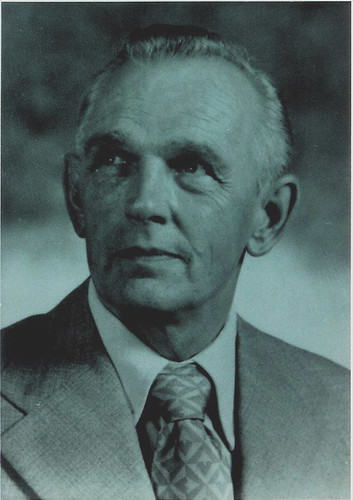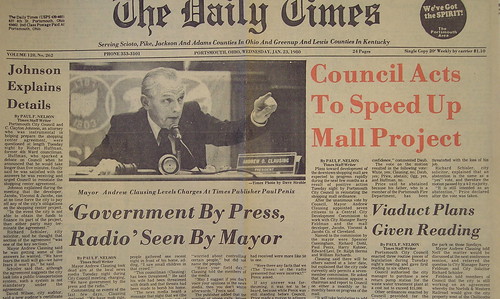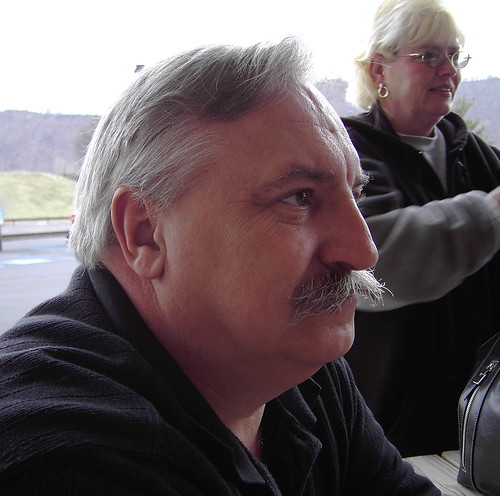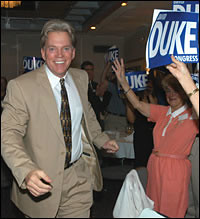While the Marting’s rip-off has gotten most of the attention in the last couple of years, another real estate shenanigan has taken place over in the 3rd St. area, which residents of that neighborhood have cynically nicknamed “Hatcherville.” The shenanigans in Hatcherville make the $2 million Marting’s deal on Chillicothe St. look like small potatoes. When it comes to the properties in Hatcherville, the relationship between the city of Portsmouth, the developer Neal Hatcher, and Shawnee State University is as shadowy as a midnight drug deal in an alley on John Street.
A student housing contract Neal Hatcher has with SSU stipulates a value of $2.5 million on the first two of his 3rd St. Campus View buildings (Campus View I) and $3 million on his third and fourth buildings (Campus View II), with those figures increasing by 3% each year, plus abatements that stretch from ten to fifteen years. So $5.5 million, which increases 3% each year, is what SSU would have to pay Hatcher if it wanted to buy Campus View I and II from him. Hatcher has since built two more buildings (Campus View III) and he has plans and approval for constructing three more buildings in the area for a total of nine. Using the prices established for Campus View I and II in the contract as a guide, I estimate that the value of the nine units could be at least $13.5 million. If the inflationary increase of Campus View II over Campus View I in the contract with SSU is applied, his nine buildings might be worth about $15 million.
Hatcher would not have been able to pull off this land grab, including the sweetheart abatements, without the collusion of the City Council and of ex-mayor Greg Bauer in particular. City Council ordinances passed in 2002 gave Bauer the authority to act on his own in acquiring and disposing of properties on 3rd St., properties that the 2002 ordinances treat as “blighted” and “deteriorated.” Ordinance 2002-79 authorized the mayor to enter into an agreement with Campus View Associates (Neal Hatcher) to obtain private property for the purpose of erecting student housing. Far longer and murkier, Ordinance 2002-36 repealed Chapter 151 of the codified city ordinances and enacted a new one, called simply “Urban Renewal.” The new ordinance begins, “It is hereby found and determined that there exists within the City blighted, deteriorated and deteriorating areas of the nature defined in this chapter which substantially impair and arrest the sound growth of the community . . .”
Treating the 3rd St. area as “blighted” was part of the scam, because the blighted tag on the neighborhood may have put the deal in compliance with legal guidelines for abatements and it may also have enabled Hatcher, working closely with Bauer, to hold the threat of eminent domain over the heads of any property owners who resisted his scheme. The City Council was the Cosa Nostra and Mayor Bauer the godfather of Campus View. Bauer was empowered by the ordinances to acquire and transfer property without any accountability. For example, properties on the northwest corner of 3rd and Waller Street, which the City had acquired from Todd and Julia Ramey and Julian Mohr, were transferred by Bauer, acting for the City, to Hatcher. Normally, I was told, an ordinance by City Council is required for the City to acquire property. The 2002 ordinances, if I understand their murky language, authorized the Mayor to acquire property without an ordinance from the City Council.
I tried to find out from city officials at the Municipal Building why and how Bauer, acting on behalf of the City, had become the intermediary in this transfer of private property from the Rameys and Julian Mohr to Hatcher. I asked first City Clerk Aeh and next Mayor Kalb and then City Auditor Trent Williams if they could tell me why. They could not. The City Auditor did say he knew that the City was not involved financially in the transfer, that it paid out no money, because if it had his office would have known about it. This only further mystified the transfer of the property from the Rameys and Julian Mohr to the City and from the City to Hatcher. The City Auditor suggested I ask City Solicitor Kuhn if he could clarify the City’s role in the transfer of the property. So I emailed the Solicitor and requested under Ohio’s open records law if he had any documents that might explain why the City acted as intermediary. In his response to me, he wrote, “ Your 2/11/05 communication recited that it is ‘a request under Ohio's sunshine laws on public documents.’ Please be advised that the City Solicitor's office has no documents relating to the transaction described in your message. As City Solicitor, it [is] not my responsibility to determine ‘why’ the City does things. Rather, it is my responsibility to render legal advice to the City, and that advice is privileged and confidential between attorney and client.”
I was struck by how little city officials apparently knew about city business. Their responses reminded me of the hear-no-evil, see-no-evil, and speak-no-evil monkeys, although since we are talking about Porksmouth we might substitute three pigs (pictured below) for the three monkeys.
Below is the front page of the warranty deed recording the transfer of the property from the City of Portsmouth to Campus View Associates.
What the rigmarole of the 2002 ordinances did was lay the groundwork for Neal Hatcher to acquire property on 3rd Street that was not only not blighted or deteriorated but that should have increased in value because of its proximity to the university. Because 3rd Street between Bond and Waller was treated as a blighted neighborhood, Hatcher was able, with the connivance of the City Council and Mayor Bauer, to acquire potentially valuable property for much less than he would have otherwise have had to pay for it. This is another instance in which the so-called free market is replaced in Portsmouth by the pork market, in which those at the top are able to exploit those below them and squeeze some public dollars from the government in the bargain. "This little piggy went to market . . ."
Because Hatcher’s Campus View properties on 3rd St. are abated, he pays no taxes on them, and because he pays no taxes on them the records at the County Courthouse list no sale price. When a property is abated and off the tax-rolls, the County has no interest in what it sold for or what its value is. County records do show that the City acted as the intermediary in the transfer of the property on the northwest corner of 3rd and Waller to Hatcher. Julian Mohr transferred one parcel to the City and Todd Ramey transferred the other. The City then transferred those properties to Hatcher and Campus View. I have been told that some of the property owners on 3rd Street were surprised to find out that they had sold their property to Hatcher, because they had thought they were dealing with the City. So they were curious why the City did what it did. I continue to be curious as well, and it is not just idle curiosity.
I can think of one possibility why the City acted as intermediary. Possibly the City had to be involved in the transfer of the property from private citizens to private developer, even if just nominally, to provide Hatcher with the legal cover he needed to back up his eminent domain threats and to justify the abatements and other financial advantages he might qualify for under the ordinances. Just as money can be laundered so, apparently, can property. We don’t know what Neal Hatcher paid the Rameys and Julian Mohr in particular, because the financial figures for those transactions are not matters of public record. We don’t know whether Hatcher in this instance used the threat of eminent domain to deprive them of a fair price, or whether he may have had reason to reward one or more of them with a high price as a reward for political favors rendered. We don’t know because we all live in Hatcherville, not just the people on 3rd St., and where real estate deals involving Hatcher are concerned we are all in the dark.








